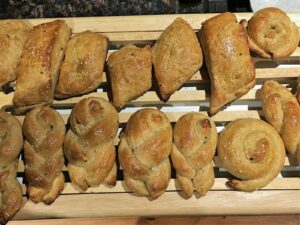

Carolann Najarian is a woman of many talents – she is a
retired physician, author, philanthropist, and now, a choreg baker.
  |
| Carolann Najarian’s whole wheat choreg |
Over the years, Carolann and I have communicated about this-and-that via The
Armenian Kitchen.
Recently she wrote saying she wanted to try her hand at baking choreg.
She said her mother used to make a choreg which was not too sweet, somewhat
dry, a bit dense, and was formed into diamond shapes. She no longer had her
mother’s recipe – a family favorite – and turned to my website hoping to find a
recipe.
  |
| Kalonji seeds |
Her mother’s recipe sounded much like a recipe request I
received ages ago for a Kharpetsi-style chorag recipe called Koolunja, a word
she wasn’t familiar with. After reaching out to my readers about Koolunja, I
never had any responses. My research provided a clue about koolunja (aka
kalonji) and discovered it means ‘black seeds’.
For Carolann’s future use, I sent her a recipe for ‘Koolenja’ by Agnes Carman Hovsepian, from
the cookbook, ‘Armenian Cuisine – Preserving Our Heritage’, St. John’s Armenian
Church, Southfield, Michigan.
| Rachel and Nonny Hogrogian’s cookbook |
“I did make the half whole wheat/ half all-purpose flour
chorag and it is very good. I used the same recipe (almost) that I used last
time simply because I had made twice before and felt comfortable with it. It is
from Rachel and Nonny Hogrogian’s cookbook, ‘The Armenian Cookbook’.” Her
recipe, an adaptation of Rachel Hogrogian’s Choreg recipe, follows.
| Carolann’s whole wheat choreg – hot out of the oven! |
Carolann Najarian’s Whole Wheat Choreg Recipe
Directions:
Sts. Vartanantz Day is a moveable celebration on the Armenian Church calendar. This year it…
Just in time for soup season, Christine Datian offers The Armenian Kitchen her recipe for…
I don’t know about you, but in our family, we’re all about tradition when…
It’s that time of year again! St. Sarkis Day, the moveable feast day on the…
Way back in 2010 Ara Kassabian shared his family’s recipe for Nevik with The Armenian…
With Thanksgiving Day just hours away, I thought I’d share a few of our favorite,…
This website uses cookies. find out more.
View Comments
I've been making choreg for many years and was never satisfied with the results until I tried the recipe in Armenian Cooking Today, a cookbook I've had since 1979. It turned out to be the best. My mother and I both made spiral and twisted shapes. Never thought of diamond shape, but I'll try it now. Looks beautiful.
The diamond shape certainly makes this an easy choreg recipe. I have the same cookbook - got it as a 1st Anniversary gift back in 1978!
Wonderful site. Thank you for these recipes.
My Mother use to roll the dough out into a large rectangle and then fold the rectangle into thirds. She would cut out diamond shapes and then let the shapes rise before cooking them. I have looked in many cookbooks and on line to see if any recipe called for her method of folding and then cutting the dough. Mon's choreg was delicious with the various layers of cooked dough rather than a single layer of dough. Have you ever seen a recipe that called for rolling out the dough and folding it? Thank you, Diane
PS ZIs Carolann from Providence, RI?
Hi Diane, I haven't seen a choreg recipe that folds the dough, but that's how I make our lavash, giving it flaky layers. https://thearmeniankitchen.com/2009/05/what-lavash-means-to-me-tell-no-one.html
Hope this helps.
As far as I know Carolann is originally from NY, then was in Mass., now in DC (if the info I saw is current).